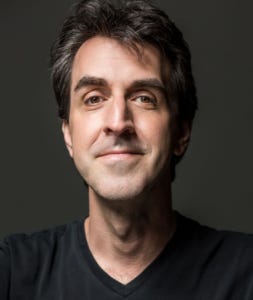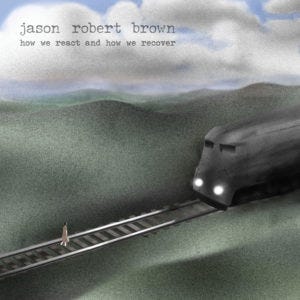JASON ROBERT BROWN ON HAL PRINCE, ARIANA GRANDE & GOING HIS OWN WAY

INTERVIEW: The last five weeks have been busy for Jason Robert Brown, the 48-year-old composer, lyricist, arranger, orchestrator and performer. There was an acclaimed Encores! run of his 1995 song cycle, Songs for a New World, at City Center; a workshop of an original musical, The Connector, written with Jonathan Marc Sherman, at Vassar College via the nonprofit New York Stage & Film; and a new album, Brown's first since 2005, How We React and How We Recover. He spoke by phone from his home on the Upper West Side. (The conversation has been condensed.)
Q: How has the political climate affected what you do?
JRB: I don't want to watch anything that feels frivolous or create anything that feels frivolous.
Q: On the new album, there's a song about struggling to be hopeful after the presidential election and another addressed to a gun owner. Has your composing become more political?
JRB: Up until Newtown (the 2012 mass shooting at Sandy Hook Elementary School), I felt my politics were a private matter for the most part, and if I was going to speak to the political moment, it was more in a sense of optimism and uplift. After Newtown, I didn't know how to not put what I was feeling directly into the work.
Q: Any negative consequences?
JRB: It's not like my politics were ever a secret. Not like, 'Oh, you never know with Jason Robert Brown. He may not be some hyper-liberal Jewish guy from New York.' In fact, that's exactly what I am. I don't see any point in trying to hide that to placate someone who would support this administration, which is just ludicrous.
Q: "Invisible" sounds like it could be a Top 40 hit. Did you ever think about Ariana Grande (who appeared in Brown's musical 13) performing it?
JRB: I would like that and I occasionally put out feelers. The point of "Invisible" was to sound like it could be a hit because the girl I wrote it for was 11 years old and I thought she doesn't want to hear some strange gnomic atonal nonsense that I would normally write. (He wrote it for Josie Ramnanan, "a sassy and tough little girl in a very big wheelchair," according to Brown.) She wants to hear something that sounds like what she hears on the radio. The point is to allow the song to speak for people who don't feel they have a voice.
Q: Might you work with Ariana Grande again?
JRB: The best way to say it is that Ariana and I both have paths we're on and occasionally they intersect. I think we enjoy collaborating and we have things we want to do. Neither of us is sitting around waiting for the other one to call.

The album/Ghostlight Records
Q: "Wait 'Till You See What's Next," my favorite track on the album, reminds me thematically of "Finishing The Hat" from Sunday in the Park with George. Yet you originally wrote it for Prince of Broadway, about Hal Prince.
JRB: Hal always has this deal that the day after he opens a show, regardless of the reviews, he is in his office having a meeting about the next show. That philosophy -- I created this but there is more I have to say -- I find inspiring to the point of being daunting. It's an amazing thing to do to say, 'I have to keep moving forward.' It was to speak in Hal's voice. I felt that this isn't me. But as with everything Hal has given me, I turn around and find out it is me all along. I never imagined when I wrote it it would be my own anthem.
Q: Why a show, The Connector, about a fabulist at a literary magazine?
JRB: (Director) Daisy (Prince) had originally asked me to watch the movie Shattered Glass. I watched it and said I didn't want to do a musical about Stephen Glass (the discredited New Republic writer) per se, but there was this whole sense that you're supposed to trust what happens in the news because it tells a story that feels true to you. What does it mean when something feels true? We didn't do a reading of the entire show until a week after the inauguration. It was the same week that Kellyane Conway said something about alternative facts. Clearly the show has been waiting for its moment.
Q: What's next for the show?
JRB: I'm teaching at Princeton next fall and we're doing a large-scale reading and workshop in collaboration with the McCarter Theatre.
Q: Is Princeton OK with the fact that Ethan, the show's fictional fabulist, went to Princeton?
JRB (Laughing): They seem fine with it. I'm not sure whether Ethan went to Princeton or he just said he did.
Q: Music Theatre International has issued licenses for more than 1,300 productions of your musicals since 2015 alone. Is that gratifying to be performed regularly around the world?
JRB: It is sort of the point. The tricky thing has always been that my stuff is not ever commercially successful here in New York. Ultimately, all of the shows go out into the world and are embraced and performed. Of those 1,300 productions, probably 600 are for The Last Five Years, and to think there are 600 productions of that show in the last four years is amazing to me.
Q: Honeymoon in Vegas recently had an acclaimed concert version in London. Any talk about a full production in London?
JRB: I'm not in a position to say too much about it but I believe there is a big plan for the UK for Honeymoon in Vegas, which I'm very excited about.
Q: Stephen Sondheim has said he loves the show's songs, but some people thought the plot (which includes a man putting his fiancée up in a poker game) would've been better set in an earlier era. Others said it was too long. Would you consider tinkering with the show?
JRB: I'm not ruling out anything, but the concert version we did in London consisted of the entire script and score and it was a fantastic experience for all of us and it felt like what I wanted the show to feel like. I don't think we'll throw too much under the bus.
Q: You mentioned you haven't had a big New York hit. Is that something you'd actively pursue?
JRB: Bridges of Madison County and to an extent Honeymoon in Vegas were really my attempts to roll the ball straight down the middle of the alley and knock down all the pins. They were deliberately more accessible pieces and I thought were not controversial or particularly political. Those were my attempts to reach out and say to the world, 'Here I am, I'm approachable, I'm nice to talk to," and it didn't play out especially well on that front. And that was depressing, because I sort of thought, 'I don't know how to play that game any better than that.'
And at the same time, it was so clear that with a show like Hamilton and Dear Evan Hansen and Fun Home, that those people were just going entirely their own way and not worrying, as I had been worrying, about whether the audience is going like it and whether they are ready to accept it. After Honeymoon in Vegas, I said, I'm done with trying to make everybody happy, which on a personal level, I am so bad at anyway. I just thought, let's stop kidding ourselves. At this point, I really am committed to writing the stuff that interests me. One of the benefits of being 48, you really do know what you do well. and I know what I don't enjoy writing. So I don't feel I have to do any of that anymore.
Q: What do you think you do well?
JRB: The work is very sincere and honest about people and the complexities of people and who they really are. I like to look at human behavior in a very granular way and I think I do it well. And hopefully the music is good.
Editor: Alice Scovell


